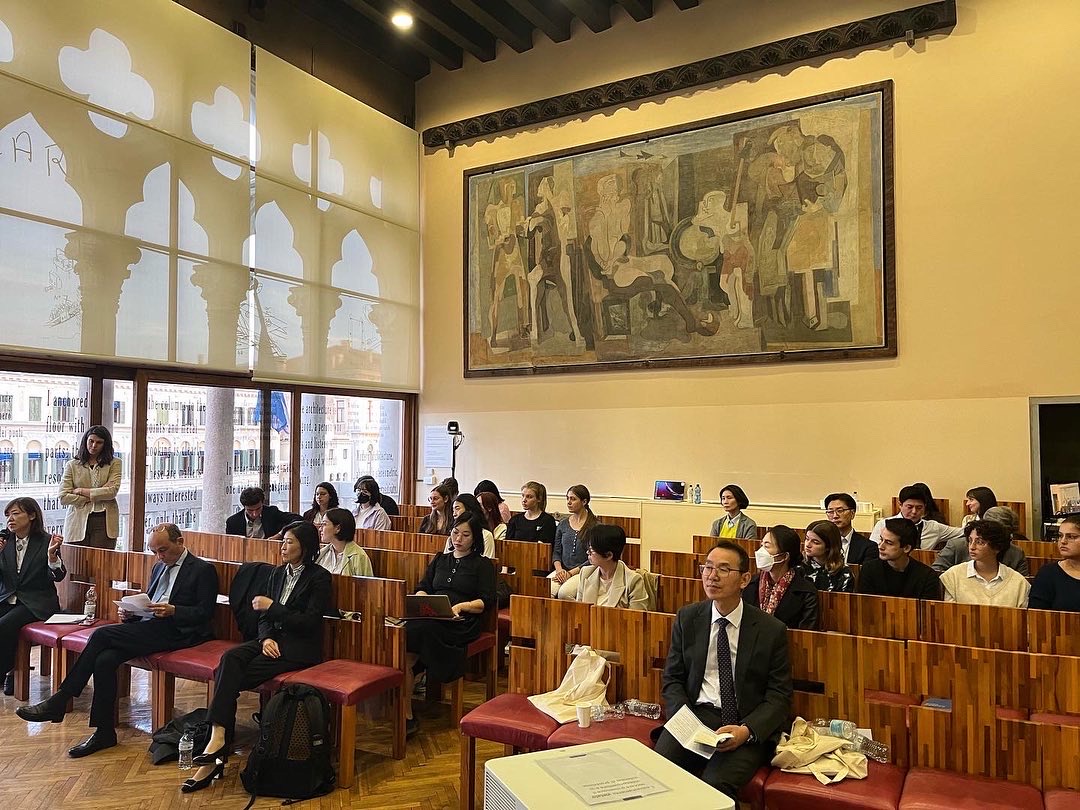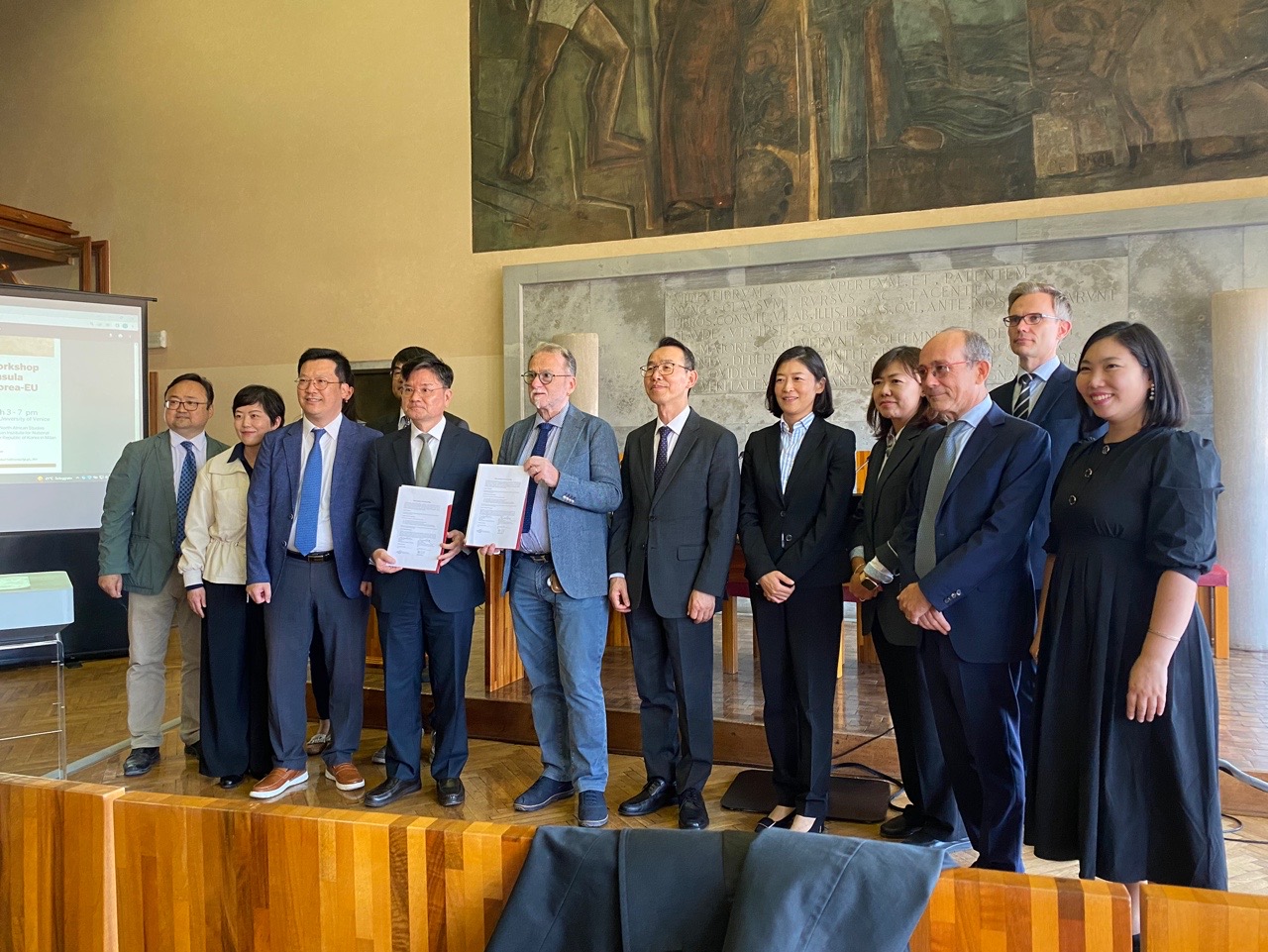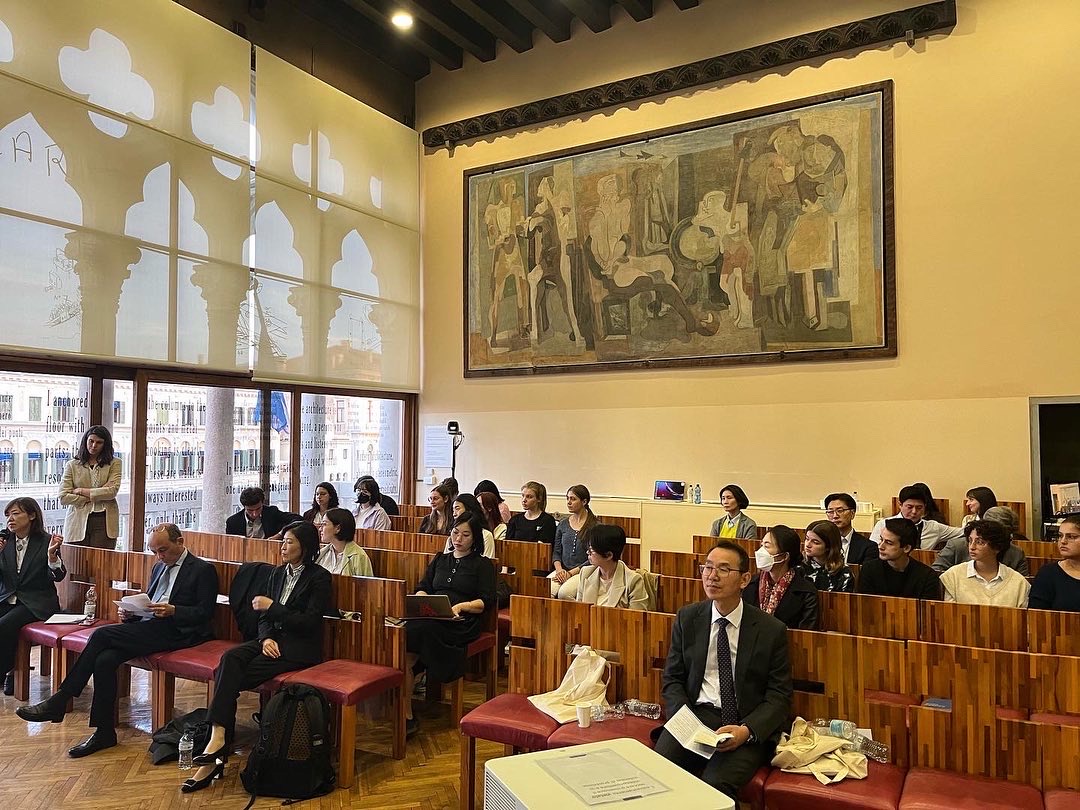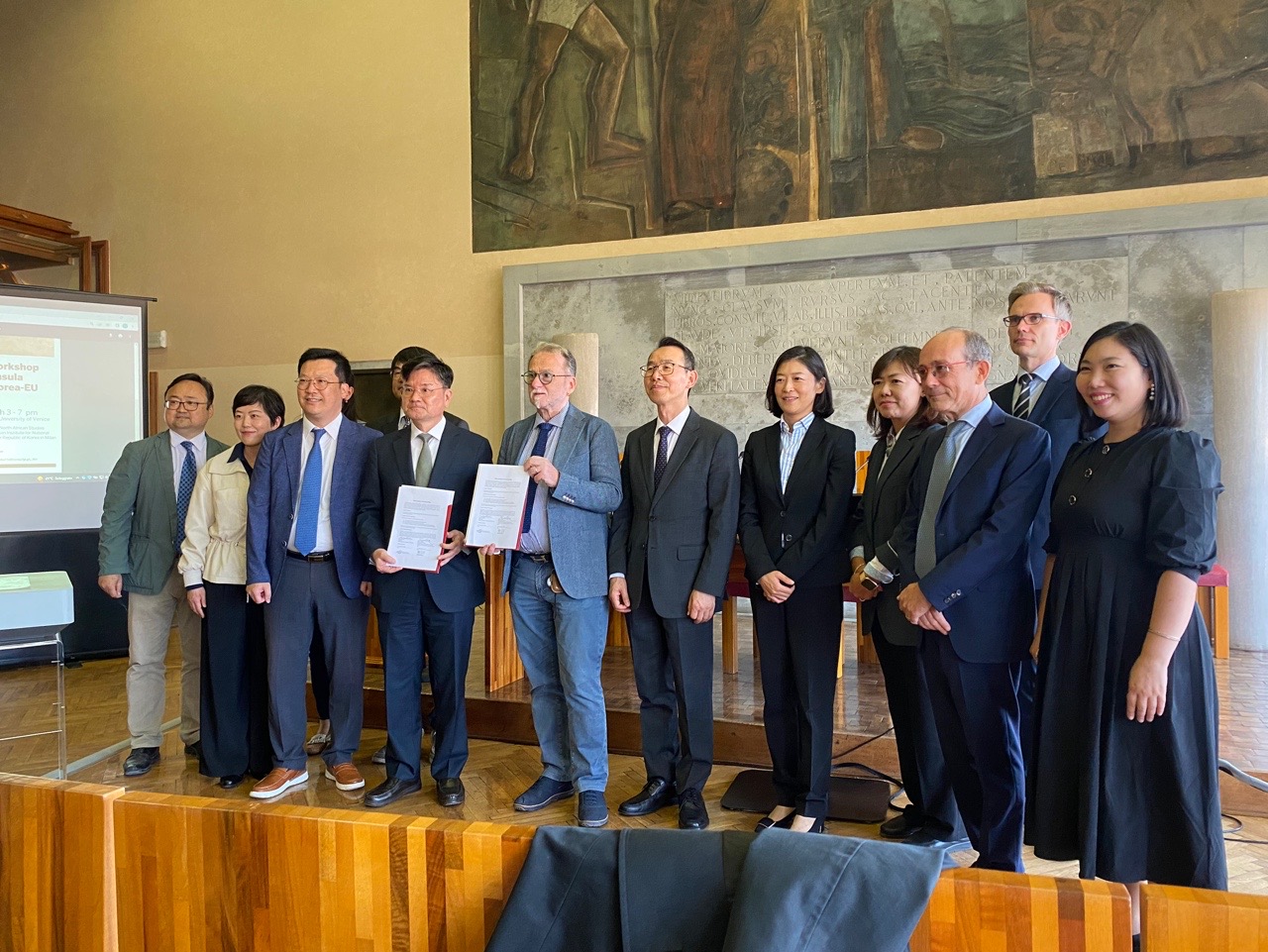-
해외 한국학자를 만나다: 이탈리아 카포스카리베네치아대학교
-
Meeting Korean Studies Scholars Abroad:Ca' Foscari University of Venice in Italy
-
안종철(카포스카리 베네치아대학교)
Jong-Chol An(Ca' Foscari University of Venice)
1. 먼저 한국학진흥사업단 뉴스레터 독자들을 위해 자기소개 부탁드립니다.
안녕하세요? 저는 이탈리아 베네치아대학교 동양학부 한국학 전공 과정에 부교수로 있는 안종철이라고 합니다. 저는 학부와 대학원 과정에서 주로 한국 역사와 사회, 전근대 한국사, 근현대 한국사, 현대 한국 사회 등을 가르치고 있습니다. 한국과 미국, 독일 등에서 교육받고 일을 한 경험이 있어서 모든 수업은 영어로 진행합니다.
2. 현재 이탈리아 내에서 K-pop, 드라마 등 한류 문화에 대한 관심이나 한국에 대한 인식은 어떠한가요?
최근 몇 년 새에 부쩍 관심이 늘었습니다. 영어권이나 독일, 프랑스보다는 한류가 조금은 늦게 "상륙"한 느낌이 있습니다. 하지만 꾸준하게 저변이 확대되고 있습니다. 예를 들면 북부지방인 베네치아에서 30분 정도 거리에 있는 파도바에서 가장 큰 아시아 관련 행사가 매년 12월 초에 열립니다. 이번 2022년 12월에 열린 행사에선 한국의 TV드라마, 영화, 음악 등에 대한 다양한 학술발표회도 열렸는데, 강사들이 모두 이탈리아 현지 활동가나 학자들일 정도로 한국에 대한 많은 행사는 이제 자리를 잡았다고 할 수 있습니다.
(행사관련 링크: https://www.festivaldelloriente.it/padova/).
베네치아 영화제에 2021년에 봉준호 감독이 심사위원장으로 참여했다는 것도 잘 알려져 있고, 당연히 다양한 한국 작품들도 영화제에 초대받았습니다. 또한 베네치아 비엔날레의 한국관은 이례적으로 2022년에 최소 5개 이상의 공간들에 한국 작가들의 작품들이 전시했는데 이제는 한국 미술이나 예술이 특이한 것이 아닌 세계무대에 설 자격을 얻고 있다고 보여집니다. 특히 현대 미술의 경우에는 그 전위적인 특성으로 호평을 받았습니다. 또한 나폴리에 2022년 여름에 입단한 축구선수 김민재의 활동은 이미 현지에서 주목을 받고 있는데, 특히 나폴리 팀이 이탈리아 축구 리그에서 1위를 달리고 있기에 김민재의 활동은 많이 언급되고 있습니다. 특히 최근에 이러한 성취를 통해서 이탈리아에서 한국인들은 중국이나 일본 등 다른 아시아 국가와 다른 점이 뚜렷한 사람들로 매우 긍정적으로 평가되고 있습니다.
3. 카포스카리베네치아대학교의 한국학 프로그램이나 연구 활동 등은 어떤 것이 있는지 소개해 주시고 활동 결과나 성과는 어떠한지 설명 부탁드립니다.
베네치아대학교에서의 한국학은 2000년대 후반 무렵부터 존재했으며, 현재 완전히 독립적인 학부 전공프로그램으로 자리매김한 지는 수 년이 되었습니다. 2020년부터는 한국학 전공 학생들이 매년 100명씩 입학하고 있는데 단과대 내에서 아주 경쟁이 치열한 학과로 평가받고 있습니다. 현재 학과 내에는 저를 포함해서 정년을 보장받은 교수가 2명, 정년 트랙에 1명, 그리고 비정년 트랙에 1명 총 4명의 교수가 있고, 박사후 연구원 1명(AKS 지원), 일반 연구원 1명(AKS지원), 그리고 외래교수 1명, 또한 정년직 어학 강사가 2명이 있습니다. 유럽 내에서 매우 큰 한국학 팀이라고 할 수 있습니다. 특히 2018-19년에 세 명의 교수가 임용되면서 한국학과가 독립하는 데에 결정적인 역할을 했습니다. 교수들은 역사와 사회, 문학, 종교학, 언어학 등을 담당하고 있고, 한국학 교과과정도 한국어와 더불어 한국사와 문학, 종교철학, 예술사 등 주로 인문학 과정으로 이루어져 있습니다.

2021년 가을에는 해외한국학씨앗형사업의 학내 연구자금으로 한국학 최초의 박사과정 학생이 입학하게 되었는데 박사과정은 등록금과 생활비 일체를 3년간 지원받습니다. 또한 2022년 가을에는 한국학 석사과정이 생겨서 약 20명이 입학해서 공부하고 있습니다. 현재 석사과정인 학생은 서울대 인문대학과 공동학위 과정을 위해 준비하고 있습니다. 이를 통해 학부-석사-박사로 이어지는 자체적인 교육체제에 더해 국제화된 교육프로그램이 갖추게 되었습니다. 특히 2020년에 한국학중앙연구원의 씨앗형 사업은 학생들의 장학금, 연구원 채용, 다양한 국제 및 국내 학술회의, 초청 강연 등을 가능하게 함으로써 한국학이 베네치아대 내에 확고히 존재감을 인정받는 계기가 되었습니다.
한국학 교직원들이 연구하는 프로젝트는 씨앗형 사업 참여 외에도 몇 개가 더 있습니다. 현재 종교사에 관심이 있는 교원이 PRIN Project(이탈리아 교육부 지원)에서 한국의 종교와 국가의 관계를 연구하는 프로젝트를 계획하고 최종결과를 기다리고 있습니다. 또한 저의 주도하에 "국제법과 한국사(Intenrational Law and Korea, 1880s-1940s)"라는 2년 프로젝트가 2021년 11월부터 시작되었습니다. 이러한 여러 프로젝트를 통해서 2020년 가을부터는 매학기 최소 3-4명의 강연자들을 온라인 혹은 직접 초청할 수 있었습니다. 이 외에도 외부 기관과 협업하여 국제학술회의를 조직하기로 했는데, 지난 2022년 9월 23일 밀라노 총영사관과 서울의 통일연구원, 저희 프로젝트 팀 총 3개 기관이 한반도 문제에 대한 정책 세미나를 열기도 했습니다.
4. 카포스카리베네치아대학교은 2020년부터 해외한국학씨앗형 사업에 참여하면서 "한국에서의 동서양"이라는 과제를 수행하고 있습니다. 현재까지 과제는 어떻게 진행되고 있으며 현장에서 겪는 어려움이 있다면 무엇일까요?
2020년부터 해외한국학씨앗형 사업에 참여하면서 "한국에서의 동서양"이라는 과제를 수행하고 있고 현재 2022년 말 3차년도 사업을 진행하고 있습니다. 과제의 필수 의무사항인 연구자 고용, 매년 최소 1회의 Workshop, 학생장학금, 강의 개설 등의 의무를 현재까지 잘 수행하고 있습니다. 그 외에도 저희 한국학과 학생들과 교직원들에게 도움이 되고자, 매 학기 초청 강연 시리즈를 진행하고 있으며, 학교 측으로 박사과정 장학금을 매칭펀드로 받아 운영하고 있습니다. 또한 1차, 2차 연도 연차보고서는 좋은 평가를 받으며 잘 마쳤습니다.
저희 팀의 힘이 닿는 한(혹은 넘어서), 여러 행사를 진행하고 있는데, 특히 2021년 가을에 이탈리아의 젊은 한국학 연구자들의 전체 모임을 진행하기도 했습니다(1st Korean Studies Young Scholars Meeting). 이 모임의 취지에 동의해준 이탈리아 내 한국학 연구자들이 다른 곳에서도 돌아가며 모임을 개최하자고 하였고, 2022년 11월 28일에는 나폴리에서 2회 대회를 진행했습니다. 3회 대회는 2023년 하반기에 이탈리아 중부의 시에나대학교에서 열릴 예정입니다. 이 과정을 통해서 저희 한중연 팀이 베네치아대학교만 아니라 전체 이탈리아 한국학의 교류에 기여 했다고 생각합니다.

현장에서 겪는 어려움은 특별한 것이 없습니다. 다만, 연구업적 부분에서 해외 저널에 논문이 출판되거나 저서가 출간되는 것은 시간이 많이 걸리기 때문에 한국과 비교해 출판 속도가 현저히 늦어지는 것은 약간 고려해야 할 듯합니다. 학내 규정과 한중연의 지원 간의 맞지 않는 부분이 약간은 있지만, 그것은 큰 문제가 되지 않고 합의점을 잘 찾아가고 있습니다.
5. 해외한국학씨앗형 사업을 수행하면서, 혹은 앞으로 꼭 이루고 싶은 장기적 목표나 바람이 있다면 무엇일까요?
첫째, 현재 베네치아 한국학 전공은 제도를 굳건히 하는 데 힘을 쏟고 있으며 일정한 성과를 얻고 있습니다. 이부분에서 해외한국학씨앗형사업의 지원이 아주 중요한 역할을 했습니다. 이것을 발전시켜서 석사와 박사과정 체계를 더 건실하게 만들고 싶습니다. 특히 석사과정의 장학금을 통해서 우수한 학생들이 안정적으로 대학원에 들어오는 분위기를 만들고 싶은데, 그 점에서 한중연의 지원은 아주 요긴했고 앞으로도 그럴 것 같습니다. 박사과정은 현재 격년이나 3년에 한번 학생을 채용하는데, 향후에는 매년 우수한 학생들이 들어오게 만들고 싶으며 그렇게 하자면 결국 학부와 석사과정의 교육이 아주 중요할 듯합니다.
둘째, 씨앗형 사업의 심화단계를 통해서 2023년 부터는 좀 더 제도적 차원의 도약을 해보고 싶습니다. 특히 현재 한국학연구센터를 만들려고 여러 가지를 모색하고 있는데, 한국학연구센터를 통해서 한국과 이탈리아의 연구 및 인적 교류에 기여하고 싶습니다. 특히 베네치아대학은 동양학(중동지역도 포함)이 전체 8개 단과대 중 하나의 단과대(Dipartimento라는 이름을 사용하지만 사실상 단과대 혹은 학부)로 되어 있어서 한국학 연구에도 아주 좋은 환경을 제공하고 있습니다. 즉 센터가 설립된다면 학내 한국학 연구자와 유관 연구자들이 함께할 수 있는 플랫폼을 제공함으로써 연구기능을 더욱 안정적으로 확보할 수 있게 됩니다.
셋째, 베네치아의 지리적, 문화적 배경하에서 한국학의 연구가 보다 동서 문화 교류에 초점을 맞추어 진행되기를 기대합니다. 베네치아는 고대로부터 실크로드와 해상을 통해서 중동지역과 아시아와의 교역에 핵심적인 역할을 해왔습니다. 이 점은 오늘날에도 크게 다르지 않아 보입니다. 그런 점에서 베네치아는 동서양의 문화가 만나는 장을 제공하고 있다고 생각하는데, 예를 들면 격년으로 진행되는 예술행사인 베니스 비엔날레는 전세계의 예술인들을 모으고 있고 매년 진행되는 베니스 영화제는 전세계 영화인들의 로망으로 여겨집니다. 또한 베네치아가 가지고 있는 수많은 박물관과 미술관 등도 중요한 문화적 교류를 잘 보여주고 있습니다. 그렇기에 한국학에서도 고대의 한국과 대외관계, 중세-근세의 한국의 인접국과의 사상적 교류, 근현대의 수많은 동서 문화 속의 한국의 위상 등을 연구하는 장이 펼쳐지기를 기대합니다. 또한 베네치아는 미래의 기후 문제나 교육 문제 등을 연구하는 다양한 장들을 가지고 있고, 한국학에서도 미래 한국과 세계가 당면한 수 많은 문제들을 연구하는 것을 목표로 하고 있다는 점에서 앞으로 예술사 전공자, 영화전공자, 그리고 사회과학 연구자의 합류나 채용이 이루어지기를 바라고 있습니다.
6. 저희 질문에 대해 답변해 주셔서 감사드립니다. 마지막 질문입니다. 한국과 이탈리아의 한국학 연구를 위해 함께 할 수 있는 일은 무엇이 있을까요?
다양한 연구를 함께 할 수 있습니다. 첫째, 한국과 이탈리아(바티칸)의 관계사는 거의 다루어지지 않았습니다. 잘 알다시피 이탈리아 통일의 삼걸(가리발디, 마치니, 카부르)에 대해서는 20세기 초부터 한국에서 잘 알려져 있지만 이에 대한 지식 사회학적 혹은 역사학적 연구는 이루어지지 않고 있습니다. 또한 가톨릭과 관련하여 풍부한 역사적 교류에 대해서도 더 많은 연구가 이루어질 필요가 있습니다.
둘째, 개인적으로 견해로 이탈리아 한국학, 특히 베네치아는 이제 인건비 지원보다는 프로젝트 지원이 더 효과적이라고 생각합니다. 씨앗형 사업의 경우에 보듯이 정말 한국학의 "씨앗"이 되어서 다양한 효과를 낳고 있습니다. 그것은 교육, 연구, 인적 교류 등을 통해서 놀라운 결실을 맺고 있지만 제 바람은 이것을 더 확대해갈 수 있을 것입니다.
셋째, 한국학만이 아닌 다른 인접 분야로 확대되는 문화적, 경제적 교류를 생각해볼 수 있습니다. 서로의 산업구조가 상당히 보완적이라는 것을 생각할 때, 현재 두 나라의 경제 문제에 상호 도움이 되는 방향으로 연구하고 협력할 필요가 있을 것입니다. 특히 베네치아는 경제학이나 문화재 보존 등에서도 뛰어난 프로그램을 가지고 있기 때문에 다양한 혁신적인 연구를 수행할 수 있을 것입니다.
-------------------------------------------------------------------------------------------------------------
Meeting Korean Studies Scholars Abroad
Jong-Chol An
Ca' Foscari University of Venice
1. Please introduce yourself to the readers of the KSPS Newsletter.
Hello. My name is Jong-Cheol An, and I am associate professor of the Korean Studies program in the Department of East Asian Studies at Ca' Foscari University of Venice in Italy. I teach mainly Korean history and society, pre-modern Korean history, modern and contemporary Korean history, and contemporary Korean society at the undergraduate and graduate level. As a scholar with educational experience in Korea, the US, and Germany, I conduct all my classes in English.
2. In Italy, what is the current interest in the Korean Wave, such as K-pop and dramas, and what is the awareness of Korea?
Interest has dramatically increased in the past few years. Compared to the Anglosphere or Germany or France, it feels like the Korean Wave has “washed ashore” a bit later in Italy. Despite this, the base [for the Korean Wave] is steadily expanding. For example, the largest Asia-related event in Italy’s northern region is held annually in early December in Padova, about 30 minutes away from Venice. This year’s event, held in December 2022, included diverse academic conferences about Korean TV dramas, movies, and music. To the extent that the lecturers were all local Italian activists or scholars, it can be said that diverse events about Korea have found their place.(https://www.festivaldelloriente.it/padova/).
It is also well known that director Bong Joon-ho participated at the 2021 Venice Film Festival as president of the jury. And, of course, diverse Korean works have been invited to screen at the film festival. Furthermore, to the extent that the works of Korean artists were exhibited in no fewer than at least five spaces at the Korean Pavilion of the Venice Biennale in 2022, it appears that Korean art is not seen as strange but rather has qualified to stand on a global stage. In particular, in the case of contemporary art, it is favorably evaluated for its avant-garde character. Furthermore, footballer Kim Min-jae has been in the local spotlight since signing with S.S.C. Napoli in Summer 2022. In particular, the fact that S.S.C. Napoli is ranked first in the Italian Serie A league is being referenced in relation to Kim Min-jae’s activities. In particular, through these sorts of recent achievements, Koreans are being very positively evaluated as people distinguished from other Asian countries such as China or Japan.
3. Please introduce Ca' Foscari University of Venice’s Korean Studies programs or research activities and explain their results or outcomes.
Korean Studies has existed at Ca' Foscari University of Venice since the late 2000s. Currently, it has established itself as a completely independent undergraduate major program for several years. Since 2020, 100 students have matriculated to the Korean Studies major each year, and it is evaluated as a fiercely competitive school within the college. Currently, there are two tenured professors including myself, one tenure-track professor, and one non-tenure track professor, for a total of four professors. There is one post-doc researcher (funded by AKS), one regular researcher (funded by AKS), one adjunct professor, as well as two tenured language lecturers. Within Europe, it can be said to be a very large Korean Studies team. In particular, the hiring of three professors in 2018-19 can be said to have played a decisive role in the Korean Studies [program] gaining independence. The professors are responsible for history and society, literature, religious studies, and linguistics. The Korean Studies curriculum is composed primarily of a humanities curriculum, including the Korean language, as well as Korean history and literature, religion and philosophy, and art history.

In Autumn 2021, the first Korean Studies PhD student matriculated using the university’s matching funds for the Seed Program, which covers tuition and all living expenses for three years. Furthermore, the Korean Studies master’s program launched in Autumn 2022, and about 20 students have matriculated and are now studying. Currently, the master’s program is under preparation to become a joint-degree program with the College of Humanities at Seoul National University. Through this, we have gone beyond a self-contained education system comprised of undergraduate, master’s, and doctoral [programs] to be equipped with an internationalized education program. In particular, the 2020 Academy of Korean Studies Seed Program made possible student scholarships, researcher recruitment, diverse international and national conferences, as well as guest lecturers, which became an impetus for Korean Studies to be made firmly known and its presence to be recognized within Ca' Foscari University of Venice.
Apart from the Seed Program for Korean Studies, there are several more projects being researched by the Korean Studies faculty. Currently, faculty interested in the history of religion are organizing and waiting for the final results of the PRIN Project (funded by the Italian Ministry of Education), which researches Korea’s religion and national relations. Furthermore, under my lead, a two-year project entitled “International Law and Korea, 1880s-1940s” began in November 2021. Through these sorts of various projects, we could invite in person or virtually no less than three to four guest lecturers each semester since Autumn 2020. Apart from this, we plan to organize an international conference in cooperation with external institutions. On November 23, 2022, our project team, together with Consulate General of South Korea in Milan and the Korean Institute for National Unification in Seoul, organized a policy seminar about issues regarding the Korean Peninsula.
4. Ca' Foscari University of Venice has participated in the Seed Program for Korean Studies since 2020 with the project “East and West in Korean Studies.” Thus far, how has the project been going, and what difficulties have been faced?
While participating in the 2020 Seed Program for Korean Studies, we have been carrying out the project “East and West in Korean Studies.” Currently, as of late 2022, we are in the third year of the project. We have reliably carried out the necessary duties of the project, such as hiring researchers, hosting workshops at least once per year, providing student scholarships, and opening new courses. Apart from this, we have held an invited lecturer series each semester to help our Korean Studies students and faculty. We have also received and have utilized a matching fund from the university for a PhD scholarship. The project’s Year One and Two annual reports received a positive evaluation and were completed well.
To the fullest of our team’s capacity (or possibly beyond), we are holding various events. In particular, in 2021, we also held the first Korean Studies Young Scholars Meeting, a gathering for young Korean Studies scholars across Italy. The Korean Studies scholars in Italy who agreed with the aim of this event wanted it to be held in other locations as well. So, the second meeting was held on November 28, 2022, in Naples, and the third meeting is scheduled to be held in late 2023 at the University of Siena in central Italy. Through this program, I think our AKS team has contributed to the exchange of Korean Studies not only at the Ca' Foscari University of Venice, but Italy as a whole.

We did not experience any particular difficulties in the field. However, in terms of research achievements, the publication of international journal articles or books is taking a long time, so this significant delay when compared to the speed of Korean publishing seems to be something to take into slight consideration. There is also a slight discrepancy between the university’s internal regulations and the support from AKS, however this has not been a big issue, and we are successfully finding a middle ground.
5. What long-term goal or wish do you hope to be achieved during or after this Seed Program for Korean Studies?
First, Korean Studies at Ca' Foscari University of Venice currently endeavors to strengthen the system and has achieved certain results. The support of the Seed Program for Korean Studies project played a very important role. I hope to develop this further to make the master’s and doctorate programs more sound. In particular, through a scholarship for the master’s program, I want to create an atmosphere in which outstanding students can stably enter the graduate school. In this regard, the support of AKS was very important and will continue to be so going forward. The PhD program currently recruits students once every other year or every three years, and in the future I want to make it so that outstanding students can enroll each year. In order for this to happen, ultimately the education of the undergraduate and master’s programs will be very important.
Second, through the advanced track of the Seed Program, from 2023, I want to take a leap forward on a more institutional level. In particular, I am currently in various stages of exploring the creation of a Korean Studies Research Center, through which I want to contribute to the scholarly and personal exchange between Korea and Italy. In particular, at Ca' Foscari University of Venice, East Asian Studies (which includes the Middle East region) is one among eight colleges (dipartimento), which provides a very good environment for Korean Studies as well. In other words, if a center is established, this will provide a joint platform for the university’s Korea-related researchers and other relevant researchers, thus stably ensuring research functionality.
Third, in regard to Venice’s geographical and cultural background, I hope that Korean Studies research will put a focus on cultural exchange between the East and the West. Since ancient times, Venice has played a critical role in trade with the Middle East and Asia over the Silk Road and the seas. This appears to be virtually no different today. In this regard, Venice provides a meeting venue for the cultures of East and West. For example, global artists gather at the Venice Biennale, a biannual art event, and the annual Venice Film Festival is the dream of the filmmakers all over the world. Venice’s many museums and galleries also show important cultural exchange. In this regard, I hope to open a research venue for Korean Studies as well, including ancient Korea and foreign relations, ideological exchange between medieval and modern Korea and its neighboring countries, as well as Korea’s status in many modern and contemporary Eastern and Western cultures. Furthermore, because Venice has diverse venues for researching the future issues of climate and education, another goal is the research, within a Korean Studies [context], of the many issues that will be faced by Korea and the world in the future. In this regard, I hope for the future recruitment of art history and film majors, as well as social science researchers.
6. Thank you for your detailed answers to our questions. In conclusion, what work can be done together in Korea and Italy for Korean Studies research?
Diverse research together can be done together. First, the history of the relationship between Korea and Italy (the Vatican) has hardly been dealt with. As you well know, the three figures behind the unification of Italy (Garibaldi, Mazzini, Cavour) have been well known in Korea since the early twentieth century, but intellectual sociological or historical research on this is not being conducted. Furthermore, there is a need for more research to be conducted on the rich historical exchange relating to Catholicism as well.
Second, in my personal experience, rather than the support of personnel expenses, I think project-based support is more effective for Korean Studies in Italy, and Venice in particular. As seen in the case of the Seed Program, [such support] truly becomes a “seed” for Korean Studies that brings forth diverse effects. This has come to remarkable fruition through education, research, and human exchange, and I hope this will be expanded further.
Third, we can also think about cultural and economical exchange with other adjacent fields apart from just Korean Studies. When thinking of how the industrial structures [of the two countries] are quite complementary, there is a need to research and collaborate in a direction that provides mutual help to both countries’ current economic problems. In particular, because Venice has excellent programs related to economics and cultural heritage preservation, various innovative research can be conducted.
-
글쓴날 : [22-12-30 14:57]